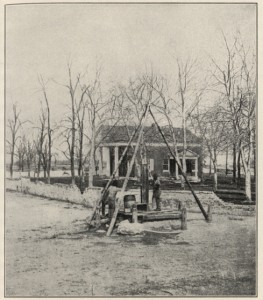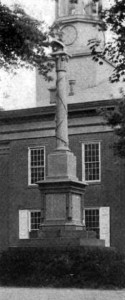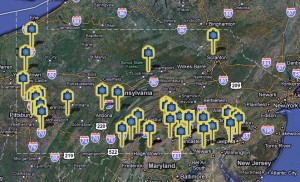
Using free tools from Google Maps, we have launched a dynamic new map of Pennysylvania’s hallowed grounds that attempts to chart the burial locations of black soldiers from Pennsylvania who fought in the Civil War. In particular, this map-in-progress highlights cemeteries that hold the remains of the 100 Voices, or representative figures being memorialized by the 2010 PA Grand Review initiative. For example, three members of the 100 Voices are buried at Midland Cemetery in Steelton, Pennsylvania —Lemuel Butler, Andrew Hill and Charles Henderson. Visitors to the dynamic online map will find photographs and exact GPS coordinates of their headstones (courtesy of Calobe Jackson, Jr.) as well as background information on these men. Each online cemetery marker also includes information such as photographs or videos (where available) of the cemetery and whatever additional background information might be contained within Dickinson College’s House Divided research engine or at the Pennsylvania Grand Review website. This particular Hallowed Grounds map is ongoing project that needs your help. Please feel free to contribute photos, videos, GPS coordinates (obtainable through smart phones or GPU handsets) by sending them to us at hdivided@dickinson.edu. Other Civil War Era-related dynamic maps, such as one concerning the Underground Railroad in Pennsylvania or Frederick Douglass’s childhood in Baltimore, have been posted here.
1
Jul
10
Hallowed Grounds Google Map
Posted by solnitr Published in 19th Century (1840-1880), Maps, Places to Visit Themes: Battles & Soldiers1
Jul
10
Battle of Spotsylvania, May 8-21, 1864
Posted by mckelveb Published in Civil War (1861-1865), Images, Letters & Diaries, Maps, Places to Visit Themes: Battles & SoldiersThe Battle of Spotsylvania took place from May 8-21, 1864 in Spotsylvania County, Virginia following the Battle of the Wilderness. Union General Ulysses S. Grant and his forces attacked Confederate General Robert E. Lee during Grant’s attempt to advance to Richmond. Although the fighting was fierce the Confederate Army was unable to stop the progress of the Union troops as Grant was able to continue moving towards Richmond on May 21. The National Park Service’s website provides an overview of the battle as well as links to a virtual tour of the battleground. Also included is information for visiting the battlefield which may be valuable for teachers looking to plan a field trip to the area. The Civil War Preservation Trust’s website has historical maps as well as a collection of photographs with different markers and monuments located in the battlegrounds. Gordon C. Rhea commented on the significance of the battle in his book The Battles for Spotsylvania Courthouse and the Road to Yellow Tavern:
“Grant’s simple message carried the matter-of-fact assurance that the general meant to stay the course. He was holding true to his clear vision of the road to victory. The Wilderness had sorely tested his resolve, and after two days of bitter combat he was forced to concede that Lee had maneuvered him to impasse. But he wisely recognized that the Wilderness was just a tactical reverse, not the end of the campaign. Grant’s strategic objective of destroying Lee’s army remained unchanged. His task now was to find another way to bring the wily Virginian to battle on terms more favorable to the Federals.”
Another resource which may be useful is The War of the Rebellion: a Compilation of the Official Records of the Union and Confederate Armies which provides several letters of correspondence between different commanding officers during the Battle of Spotsylvania. James McPherson’s Battle Cry of Freedom, available in limited view on Google Books, gives another overview of the battle and its participants. Also, the Library of Congress’s collection of Lincoln Papers provides a few different original letters along with transcriptions regarding the battle including one from General Grant to President Abraham Lincoln that gives Grant’s personal account of the Union Army’s progress.
28
Jun
10
Oliver et al. v. Kaufman and Fugitive Slaves
Posted by rothenbb Published in Antebellum (1840-1861), Historic Periodicals Themes: Laws & Litigation, Slavery & Abolition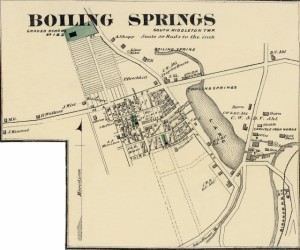 Boiling Springs, Pennsylvania embraced the transportation and protection of fugitive slaves moving northward across the Mason-Dixon Line. Daniel Kaufman (alternately spelled Kauffman), born in Cumberland County in 1818, laid out designs for the town and helped make his presence known. His support for the Underground Railroad strengthened in Boiling Springs, as indicated by the events of October 24, 1847.
Boiling Springs, Pennsylvania embraced the transportation and protection of fugitive slaves moving northward across the Mason-Dixon Line. Daniel Kaufman (alternately spelled Kauffman), born in Cumberland County in 1818, laid out designs for the town and helped make his presence known. His support for the Underground Railroad strengthened in Boiling Springs, as indicated by the events of October 24, 1847.
As shown by evidence later presented in court, thirteen slaves belonging to the Oliver family escaped in Maryland, crossed the border into Pennsylvania, and eventually found themselves in Kaufman’s barn in Boiling Springs. Kaufman consented to provide them with shelter and food, and within the next day he offered up his wagon to transport the slaves across the Susquehanna River. News of the fugitive slaves spread, and within a few short months the slave owner’s family filed a lawsuit against Kaufman.
The Court of Common Pleas of Cumberland County opened the case Oliver et al. v. Kaufman against Kaufman and two other known associates, Stephen Weakley and Philip Breckbill. The defendants argued that the suit could not be tried in state court as the issue pertained to federal law. Nevertheless, the jury delivered a verdict in favor of the plaintiff; Kaufman had to pay $2000 in damages. When a panel of judges of the Pennsylvania Supreme Court oversaw the case, their “majority opinion” notably argued “that Congress possesses the exclusive right to legislate on the subject [of fugitive slaves] and that State Legislatures have no right whatever” and could therefore not recover any damages. The Cumberland County Court’s ruling was reversed. The case continued in 1852, this time in a federal court, only to conclude in favor of the plaintiff and with Kaufman liable to approximately $4000 in damages and fines.
Kaufman’s case occurred during a period of heavy debate in Pennsylvania regarding state sovereignty and the adherence to federal mandates including the Fugitive Slave Laws of 1793 and 1850. Prior to the case seen in Cumberland County, Pennsylvania judges gave credence to the state’s “common law” and “clear right to declare that a slave brought within her territory becomes ipso facto a freeman,” as quoted by a law journal in Paul Finkleman’s An Imperfect Union: Slavery, Federalism, and Comity. traced the evolution of state sovereignty in Pennsylvania.
For a more detailed summary of the cases, the House Divided record of the case provides access to several primary documents, including newspaper articles and the Pennsylvania Supreme Court’s decision to reverse the ruling of the case. Finkleman’s book puts Kaufman’s trial into context, but his summary of the case will help those even vaguely familiar with its nuances. LexisNexis, though requiring a subscription, grants access not only to the court documents, but to modern scholarship on the case’s wider importance in the debate on Federalism and state’s rights. In Robert Kaczorowski’s article “Federalism in the 21ST Century,” the Fugitive Slave Laws emerge as the focal point for a much wider debate on the intent of the Founding Fathers with regard to state rights and federal mandates.
28
Jun
10
Christiana Riot – September 11, 1851
Posted by sailerd Published in Antebellum (1840-1861), Historic Periodicals, Images Themes: Slavery & Abolition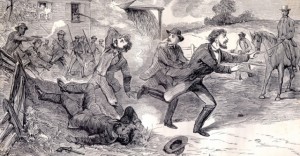 The Christiana Riot took place on September 11, 1851 when Maryland slaveowner Edward Gorsuch and several of his relatives attempted to capture fugitive slaves at William Parker’s house in Christiana, Pennsylvania. Gorsuch was killed and several members of his party were wounded in the fight, but Parker and the fugitive slaves escaped to Canada. House Divided has several newspaper articles and a diary entry related to this event, including an editorial from Frederick Douglass’ Paper. The African Americans who participated in the riot “are to be tried…for high treason,” which Douglass characterized as “the climax of American absurdity.” Editors of the Memphis (TN) Appeal, however, had a different perspective on what they called a “great judicial farce.” Instead of facing “charges of which they might by convicted,” the Appeal criticized prosecutors for their decision “to rest [the case] solely on the law of treason.” “The State authorities fail[ed] in their duty and pass[ed] over the real crimes [of] riot and murder,” as the Appeal observed. Teachers may also want to check out the resources available from “Slavery & Abolition in the US: Select Publications of the 1800s,” which is a digital collection of books and pamphlets produced by Dickinson College and Millersville University. The site has a number of great sources, including: A True Story of the Christiana Riot (1898), which is a recollection by David Forbes, and The Christiana Riot and the Treason Trials of 1851: An Historical Sketch (1911), written by William Hensel to commemorate the 60th anniversary. Two of the best secondary sources on this event are Jonathan Katz, Resistance at Christiana: The Fugitive Slave Rebellion, Christiana, Pennsylvania, September 11, 1851 (1974) and Thomas P. Slaughter, Bloody Dawn: The Christiana Riot and Racial Violence in the Antebellum North (1991). While William Parker’s house no longer exists, a historical model of the building is available on House Divided’s Virtual Field Trips page. (See this page for help in using these files).
The Christiana Riot took place on September 11, 1851 when Maryland slaveowner Edward Gorsuch and several of his relatives attempted to capture fugitive slaves at William Parker’s house in Christiana, Pennsylvania. Gorsuch was killed and several members of his party were wounded in the fight, but Parker and the fugitive slaves escaped to Canada. House Divided has several newspaper articles and a diary entry related to this event, including an editorial from Frederick Douglass’ Paper. The African Americans who participated in the riot “are to be tried…for high treason,” which Douglass characterized as “the climax of American absurdity.” Editors of the Memphis (TN) Appeal, however, had a different perspective on what they called a “great judicial farce.” Instead of facing “charges of which they might by convicted,” the Appeal criticized prosecutors for their decision “to rest [the case] solely on the law of treason.” “The State authorities fail[ed] in their duty and pass[ed] over the real crimes [of] riot and murder,” as the Appeal observed. Teachers may also want to check out the resources available from “Slavery & Abolition in the US: Select Publications of the 1800s,” which is a digital collection of books and pamphlets produced by Dickinson College and Millersville University. The site has a number of great sources, including: A True Story of the Christiana Riot (1898), which is a recollection by David Forbes, and The Christiana Riot and the Treason Trials of 1851: An Historical Sketch (1911), written by William Hensel to commemorate the 60th anniversary. Two of the best secondary sources on this event are Jonathan Katz, Resistance at Christiana: The Fugitive Slave Rebellion, Christiana, Pennsylvania, September 11, 1851 (1974) and Thomas P. Slaughter, Bloody Dawn: The Christiana Riot and Racial Violence in the Antebellum North (1991). While William Parker’s house no longer exists, a historical model of the building is available on House Divided’s Virtual Field Trips page. (See this page for help in using these files).
28
Jun
10
The Stevens & Smith Historic Site
Posted by rainwatj Published in Antebellum (1840-1861), Images, Places to Visit, Recent News Themes: Slavery & Abolition Thaddeus Stevens, one of the most powerful and controversial congressmen of the nineteenth century is the central figure of a large restoration project conducted by the Historic Preservation Trust of Lancaster County, Pennsylvania. Stevens was an adamant opponent of slavery and helped runaway slaves escape, even going so far as to employ spies to watch for slave-catchers. He was also a leading attorney in several fugitive slave cases, most notably the Christiana Treason Trial (1851). Stevens also shared his home with Lydia Hamilton Smith, a mixed race woman who managed his household affairs and also proved to be an enormously successful businesswoman herself.
Thaddeus Stevens, one of the most powerful and controversial congressmen of the nineteenth century is the central figure of a large restoration project conducted by the Historic Preservation Trust of Lancaster County, Pennsylvania. Stevens was an adamant opponent of slavery and helped runaway slaves escape, even going so far as to employ spies to watch for slave-catchers. He was also a leading attorney in several fugitive slave cases, most notably the Christiana Treason Trial (1851). Stevens also shared his home with Lydia Hamilton Smith, a mixed race woman who managed his household affairs and also proved to be an enormously successful businesswoman herself.
The Stevens & Smith Historic site is a $20 million educational and interpretive complex, integrating the restored 19th century properties of Stevens and Smith located in historic downtown Lancaster, Pennsylvania featuring an original cistern discovered in 2003 believed by historians and archeologists to have been used by Stevens and Smith as a hiding place for escaping slaves along the Underground Railroad. A cistern is an underground storage tank used for holding water.
The planning for the Stevens & Smith Historic site overcame several obstacles before its approval, specifically the original plans for a new downtown convention center in Lancaster, Pennsylvania calling for the demolition of the historic sites previously owned and managed by Stevens and Smith. The Historic Preservation Trust of Lancaster County possessed protective easements on the properties and were successful in developing a strategy for the preservation of Stevens’ Lancaster city law office and residence from the antebellum period within the new Lancaster County Convention Center.
For more information check out the Stevens & Smith Historic Site online for a full overview and updates on the project. The site also features a video on the story of Stevens & Smith and images of the proposed historical site. Fergus Bordewich’s article, “Thaddeus Stevens and James Buchanan – How Their Historic Rivalry Shaped America” is a great source for historical background on Stevens’ and Smith’s contributions and connections to the abolitionist movement in Lancaster. Further information can be found on the Thaddeus Stevens Society website including an overview of the archeological dig of the cistern conducted outside Stevens’ residence and law office. The address for the site is located at 45-47 South Queen Street Lancaster, Pennsylvania.
28
Jun
10
The Underground Railroad in Columbia, Pennsylvania
Posted by solnitr Published in 19th Century (1840-1880), Images, Places to Visit, Rare Books Themes: Battles & Soldiers, Slavery & Abolition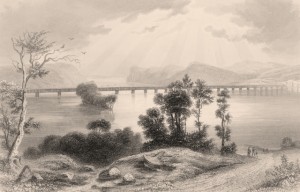 Nineteenth-century historian Robert Clemens Smedley labeled the town of Columbia, Pennsylvania as the birthplace of the organized structure that we now know as the Underground Railroad. Smedley’s posthumously published account of the Underground Railroad’s presence in Pennsylvania, History of the Underground Railroad in Chester and the Neighboring Counties of Pennsylvania (1883), is available on Dickinson College and Mercersville University’s digital collection: “Slavery & Abolition in the US: Select Publications of the 1800s .” Smedley narrates the story of the Underground Railroad with Columbia as a key station on the Underground Railroad because of its proximity to the Pennsylvania-Maryland border, just across the Susquehanna River. The Wright family, which founded Columbia in 1726, maintained a sympathetic ear towards the abolitionist cause reflecting their Quaker background. Today the Wright family home, Wright’s Ferry Mansion , is open to the public for tours. The founder’s grandson, William Wright, “an uncompromising hater of slavery,” became one of the first established agents of the Underground Railroad, setting up a network for escaping slaves in Columbia. Fergus M. Bordewich, author of the comprehensive Underground Railroad book Bound for Canaan (2005) mentions Wright briefly as “hitting on the idea of passing fugitives along from one home to another at intervals of ten or twenty miles, with other friends designated to pilot them in between.” Wright’s network included Robert Loney (or Loonee), a free black man who “ferried fugitives across the [Susquehanna] river in the night at various places below Columbia, and gave them into the care of William Wright.” Loney went on to join Company I of the 32nd Regiment of the USCT in 1864 and is buried in Columbia’s recently restored Zion Hill Cemetery (5th & Linden Streets, Columbia, PA), the burial place of many local black Civil War veterans. The Pennsylvania “Quest for Freedom ” tour, which maps the historic locations of abolition-related sites from Philadelphia to Chambersburg, includes a stop in Columbia that highlights the Zion Hill Cemetery. The USGenWeb Tombstone Transcription Project also includes a Zion Hill webpage with recent photos of fourteen USCT headstones.
Nineteenth-century historian Robert Clemens Smedley labeled the town of Columbia, Pennsylvania as the birthplace of the organized structure that we now know as the Underground Railroad. Smedley’s posthumously published account of the Underground Railroad’s presence in Pennsylvania, History of the Underground Railroad in Chester and the Neighboring Counties of Pennsylvania (1883), is available on Dickinson College and Mercersville University’s digital collection: “Slavery & Abolition in the US: Select Publications of the 1800s .” Smedley narrates the story of the Underground Railroad with Columbia as a key station on the Underground Railroad because of its proximity to the Pennsylvania-Maryland border, just across the Susquehanna River. The Wright family, which founded Columbia in 1726, maintained a sympathetic ear towards the abolitionist cause reflecting their Quaker background. Today the Wright family home, Wright’s Ferry Mansion , is open to the public for tours. The founder’s grandson, William Wright, “an uncompromising hater of slavery,” became one of the first established agents of the Underground Railroad, setting up a network for escaping slaves in Columbia. Fergus M. Bordewich, author of the comprehensive Underground Railroad book Bound for Canaan (2005) mentions Wright briefly as “hitting on the idea of passing fugitives along from one home to another at intervals of ten or twenty miles, with other friends designated to pilot them in between.” Wright’s network included Robert Loney (or Loonee), a free black man who “ferried fugitives across the [Susquehanna] river in the night at various places below Columbia, and gave them into the care of William Wright.” Loney went on to join Company I of the 32nd Regiment of the USCT in 1864 and is buried in Columbia’s recently restored Zion Hill Cemetery (5th & Linden Streets, Columbia, PA), the burial place of many local black Civil War veterans. The Pennsylvania “Quest for Freedom ” tour, which maps the historic locations of abolition-related sites from Philadelphia to Chambersburg, includes a stop in Columbia that highlights the Zion Hill Cemetery. The USGenWeb Tombstone Transcription Project also includes a Zion Hill webpage with recent photos of fourteen USCT headstones.
25
Jun
10
Dickinson College President Jesse Peck – “A Practical Joke”
Posted by sailerd Published in Antebellum (1840-1861), Historic Periodicals Themes: Carlisle & Dickinson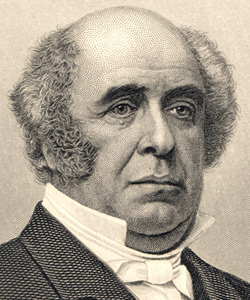 When Dickinson College President Jesse Peck arrived in Staunton, Virginia, for a conference in the spring of 1849, local authorities detained him as a result of a prank by Dickinson students. As the Richmond (VA) Examiner reported:
When Dickinson College President Jesse Peck arrived in Staunton, Virginia, for a conference in the spring of 1849, local authorities detained him as a result of a prank by Dickinson students. As the Richmond (VA) Examiner reported:
“some reprobate student…wrote a letter to the Physician of the Hospital [in Staunton], giving him a description of some individual who had left Carlisle, the seat of Dickinson College, in a state of mental derangement; and stating, furthermore, that it was more than probable that the said individual had betaken himself to Staunton, inasmuch as it was a sort of monomania with him to regard himself as the President of [Dickinson College],…. It is needles to add, that the description of the insane person coincided precisely with the appearance of the Rev. Doctor himself – and that it required the reiterated identifications of the ministers of the Conference around, to save him from confinement!”
Moncure Conway (Dickinson College Class of 1849), who later became a southern abolitionist, admitted that he was one of the student leaders involved with the prank. You can read the full story here.
24
Jun
10
 A new political movement born out of New York and Philadelphia spread across the country, emerging in Cumberland County in 1854, shaping its politics for more than two years. Spurred by anti-Catholic and anti-immigration sentiment, the Know Nothing party grew to significant prominence if only for a short period during the mid 1850s. Reverend Otis H. Tiffany was Dickinson College’s professor of mathematics and president of the Know Nothing State Council. Tiffany, a prominent leader and adamant speaker for the Know Nothing party, gave a public lecture at Carlisle Union Fire Hall on November 16, 1854 on the Protestant origins of American freedoms and on the dangers of the vast immigration and rapid naturalization of foreigners. Tiffany commented, “No foreigner is competent to discharge the duties of an American until he ceases to be identified with the land which gave him birth.”
A new political movement born out of New York and Philadelphia spread across the country, emerging in Cumberland County in 1854, shaping its politics for more than two years. Spurred by anti-Catholic and anti-immigration sentiment, the Know Nothing party grew to significant prominence if only for a short period during the mid 1850s. Reverend Otis H. Tiffany was Dickinson College’s professor of mathematics and president of the Know Nothing State Council. Tiffany, a prominent leader and adamant speaker for the Know Nothing party, gave a public lecture at Carlisle Union Fire Hall on November 16, 1854 on the Protestant origins of American freedoms and on the dangers of the vast immigration and rapid naturalization of foreigners. Tiffany commented, “No foreigner is competent to discharge the duties of an American until he ceases to be identified with the land which gave him birth.”
Many of the sources on the Know Nothings in Cumberland County are derived from local newspapers such as the Carlisle American, Carlisle Herald, Shippensburg News and American Volunteer. During this time, Tiffany and several other professors at Dickinson College had been active in the Know-Nothing movement. While most of the papers were supportive, the American Volunteer was the most negative, commonly criticizing the party and the involvement of Tiffany and others from Dickinson College. On August 23, 1857 with the Know Nothing movement nearly dissolved, the Volunteer cited the negative effects brought on by the faculty “by their constant dabbling in politics…But we gained our point which was to drive them from their Know-Nothing lodges to their duties in the College.”
While unsuccessful in sustaining the Know Nothing movement in Cumberland County, Tiffany was and remained a respected leader throughout the community. In Alexander Kelly McClure‘s Old Time Notes of Pennsylvania, he comments on the merits of Tiffany. McClure, a prominent Pennsylvania politician and journalist, regarded Tiffany as the ablest of all the Know-Nothing leaders.
“The one who stood out most conspicuous as an active politician and consistent Christian gentleman was Dr. Tiffany, who, as I have stated, accomplished the union of the opposition forces at the conference in 1855. He was not only a man of unusual eloquence, but a sagacious leader in Church and State, and always commanded the respect of all who came in contact with him, whether supporting or opposing him.”
24
Jun
10
The Soldiers Monument
Posted by mckelveb Published in Places to Visit, Reconstruction (1865-1880) Themes: Battles & Soldiers, Carlisle & DickinsonThe Soldiers Monument in Carlisle, Pennsylvania was created in a post war effort to honor the Cumberland County soldiers who died as a result of the Civil War. The efforts to build the monument were initiated by the Soldiers Monument Association in early January 1867, which included General Lemuel Todd as Chair, General Robert Miller Henderson as President, and Colonel Erkuries Beatty as Corresponding Secretary. The minutes of the Soldiers Monument Association are available for reference at the Cumberland County Historical Society in Carlisle, Pennsylvania. Fundraising continued into early 1871 until the Monument Association obtained the five thousand dollars needed to erect the monument. The extra money financed the dedication ceremonies as well as the fence that enclosed the monument. A Carlisle mechanic, Richard Owens, was responsible for contracting and designing the monument, which contained a “Roll of Honor” that provided the names of the three hundred and forty-four Cumberland County officers and soldiers that died in combat or during their term of service in the army during the Civil War. The official unveiling of the thirty foot tall Soldiers Monument took place on the Public Square near the Carlisle Courthouse on August 19, 1871 with Lemuel Todd as Chief Marshall of the ceremonies and Major General Heintzelman as the presenter of the unveiled monument. Available on Google Books, Carlisle, Old and New gives a brief description of the monument as well as some of the other historical features in Carlisle.
23
Jun
10
The Battle of Fort Henry: February 6, 1862
Posted by rainwatj Published in Civil War (1861-1865), Images, Maps Themes: Battles & Soldiers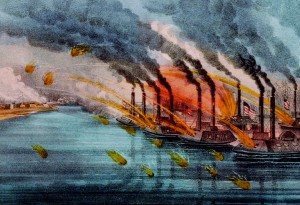 On February 6, 1862, Union Brigadier General Ulysses S. Grant and Union Flag Officer Andrew Hull Foote scored the first major victory for the Union Army in the Western Theater in the battle of Fort Henry along the Tennessee River near Stewart County and Henry County, Tennessee and Calloway County, Kentucky. Inundated by recent rain and flood water, the poorly conceived and outdated fort was defended by Confederate Brigadier General Lloyd Tilghman and just over 3000 Confederate soldiers. Grant and his 15,000 Union troops surrounded the fort while Foote and his seven gunboats began bombarding the fort. Foote and the Union’s naval power proved decisive as Tilghman surrendered before Grant’s soldiers even reached the fort. Estimated casualties for the battle were low with only 40 for the Union Army and just 80 for the Confederates. The victory at Fort Henry gave the Union Army access to the Tennessee River, a major water highway into the heart of the Confederate Deep South. In Ulysses S. Grant’s Civil War memoirs, he comments on the strategic importance of the capture of Fort Henry:
On February 6, 1862, Union Brigadier General Ulysses S. Grant and Union Flag Officer Andrew Hull Foote scored the first major victory for the Union Army in the Western Theater in the battle of Fort Henry along the Tennessee River near Stewart County and Henry County, Tennessee and Calloway County, Kentucky. Inundated by recent rain and flood water, the poorly conceived and outdated fort was defended by Confederate Brigadier General Lloyd Tilghman and just over 3000 Confederate soldiers. Grant and his 15,000 Union troops surrounded the fort while Foote and his seven gunboats began bombarding the fort. Foote and the Union’s naval power proved decisive as Tilghman surrendered before Grant’s soldiers even reached the fort. Estimated casualties for the battle were low with only 40 for the Union Army and just 80 for the Confederates. The victory at Fort Henry gave the Union Army access to the Tennessee River, a major water highway into the heart of the Confederate Deep South. In Ulysses S. Grant’s Civil War memoirs, he comments on the strategic importance of the capture of Fort Henry:
“With Fort Henry in our hands we had a navigable stream open to us up to Muscle Shoals, in Alabama. The Memphis and Charleston Railroad strikes the Tennessee at Eastport, Mississippi, and follows close to the banks of the river up to the shoals. This road, of vast importance to the enemy, would cease to be of use to them for through traffic the moment Fort Henry became ours.”
From Fort Henry to Corinth by Manning Ferguson Force is an available online nineteenth century resource for a narrative on the battle utilizing several maps to emphasize the importance of the strategic impact of capturing the fort is fully available on Google Books. Where the South Lost the War: An Analysis of the Fort Henry-Fort Donelson Campaign, February 1862 by Kendall D. Gott is another valuable book on the battle that can be previewed on Google Books. The Tennessee Encyclopedia of History and Culture provides an informative overview of the battle and has suggested readings for more information on the battle. The Library of Congress has a number of images and maps of the fort and surrounding areas.
